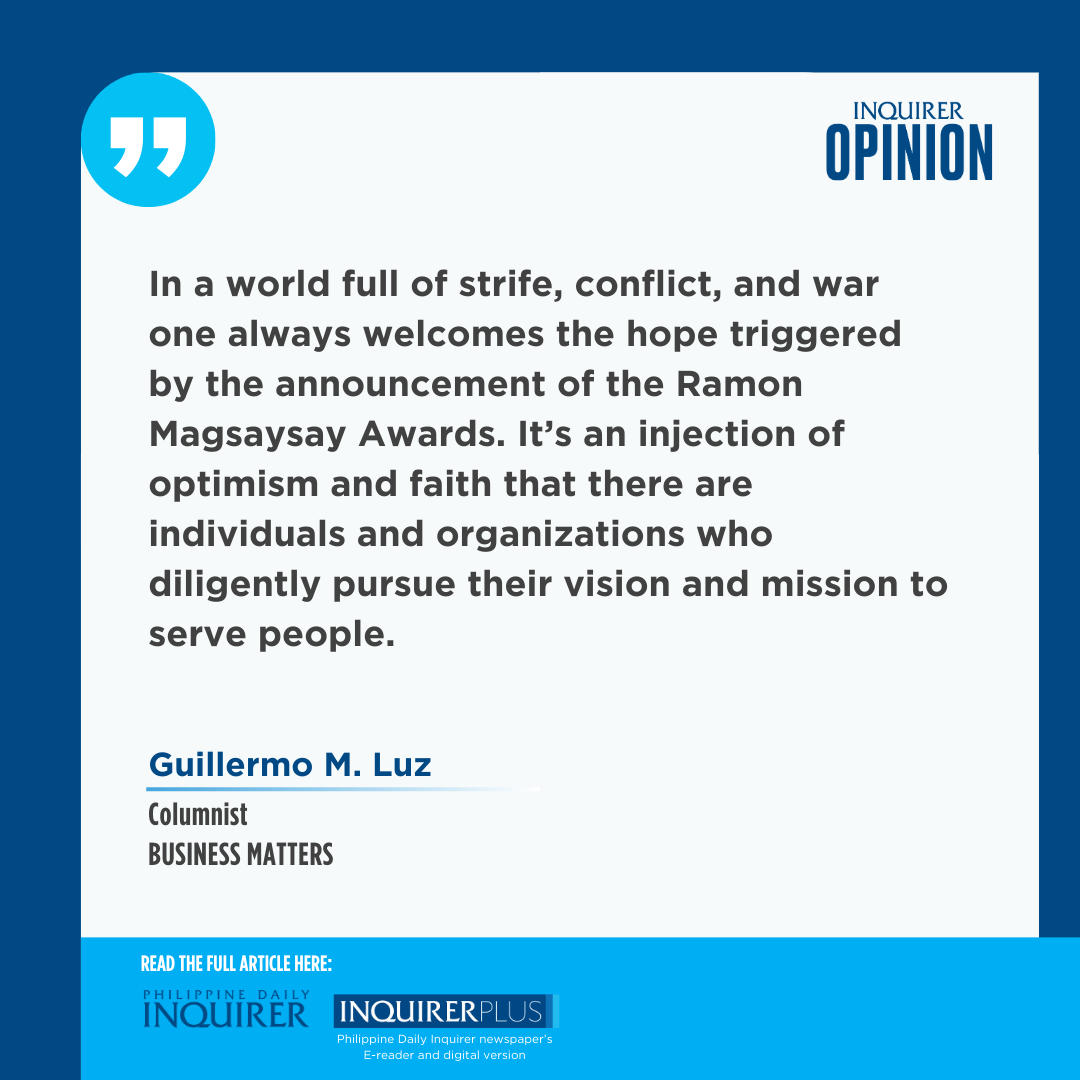Magsaysay Awards celebrate greatness of spirit
In a world full of strife, conflict, and war, one always welcomes the hope triggered by the announcement of the Ramon Magsaysay Awards. It’s an injection of optimism and faith that there are individuals and organizations who diligently pursue their vision and mission to serve people.
The awards have been given out since 1958 to individuals and organizations in Asia to honor their greatness of spirit illustrated by selfless service to the peoples of Asia. The awards were created in memory of former president Ramon Magsaysay, our seventh president who served from December 1953 to March 1957 but whose term was cut tragically short when he died in an airplane crash.
Article continues after this advertisementMagsaysay was known for his mission to improve the lives of Filipinos and for his belief that government must have integrity and reflect the will of the people. Among other things, he believed that “government exists for the welfare of the masses of the nation” and that “a high and unwavering sense of morality should pervade all spheres of governmental activity.”
This year’s five winners were announced on Aug. 31 on the birth anniversary of Magsaysay.
Karma Phuntsho of Bhutan is the founder of Loden Foundation, which is dedicated to education, social entrepreneurship, and the documentation of cultural heritage and traditions. Aside from giving out scholarships and running training sessions for entrepreneurship, Loden Foundation has documented over 3,000 hours of Bhutanese intangible assets, digitized 4.6 million pages of text, and compiled 150,000 images of arts and artifacts.
Article continues after this advertisementDr. Nguyen Thi Ngoc Phuong is a Vietnamese doctor who has dedicated her life studying the effects of the use of Agent Orange during the Vietnam War, which ran from 1955 to 1975 and caused over three million deaths. She became a doctor during the Vietnam War and noticed birth defects in babies which she later traced to Agent Orange. This pattern of birth defects ran over a period of four decades. Aside from being a doctor and researcher, she also undertook legal action internationally as she sought compensation for the victims.
Farwiza Farhan of Indonesia founded an environmental nongovernment organization to protect the Leuser ecosystem in Sumatra. This ecosystem is a 2.6 million-hectare home to many endangered species and is the Amazon of Southeast Asia. It is under threat from deforestation, encroaching infrastructure, and poor law enforcement. After the Aceh government abolished the government’s own Leuser Ecosystem Management Authority, Farhan led a group of former employees in forming a new organization to protect the ecosystem. They won a court verdict versus a palm oil company burning the forests and used the damages won in court to rehabilitate the forests.
The Rural Doctors Movement of Thailand is composed of the informal Rural Doctors Society and the more formal, incorporated Rural Doctors Foundation. They constitute a unified force of Thai doctors for rural health care and have been responsible for the implementation of universal health care across the entire Thai population. The movement has its beginnings in the 1960s when a brain drain among medical personnel led the government to create compulsory rural service for doctors. In the 1970s during the pro-democracy movement, doctors voluntarily addressed rural inequities in health care and supported initiatives in poverty-stricken areas. Interestingly, the informal society focuses on policy advocacy while the more formal foundation has doctors embedded in public hospitals who focus on implementation—a model of public-private collaboration.
Miyazaki Hayao of Japan is cofounder of Studio Ghibli and is a creator, writer, and director of animated films. His films were originally considered as simply entertainment by the public but are now considered a medium for educating. His films have tackled complex topics and issues such as war and conflict, environmental protection and the value of nature, peace advocacy, and the rights and roles of women. His films include ”My Neighbor Totoro” (1988), “Princess Mononoke” (1997), “Spirited Away” (2001), and “The Boy and the Heron” (2023).
This year’s five winners join a roster of over 340 inspirational and transformation leaders across Asia. The Ramon Magsaysay Foundation doesn’t just focus on searching for and selecting winners. The foundation also works to keep many of the laureates connected to each other and to other organizations and people so that more can learn from and leverage on their experience to also serve their communities.
—————–
Guillermo M. Luz is a member of the Board of Trustees of the Ramon Magsaysay Award Foundation and chief resilience officer of the Philippine Disaster Resilience Foundation.
—————–
Business Matters is a project of Makati Business Club (makatibusinessclub@mbc.com.ph).

















